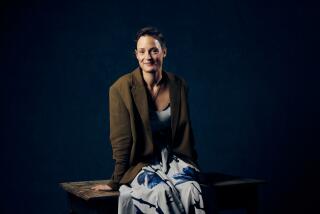A Story That’s as Strong as Its Subject : AN UNCOMMON WOMAN by Hannah Pakula; Simon and Schuster; $35, 720 pages
- Share via
If this book were a person, she would be a joy to know: handsome, intelligent, full of information but never, ever dull, a vivacious, educated being with a profoundly disciplined mind.
I can honestly say that I did not anticipate feeling this way about a brick-size biography of the Empress Frederick, eldest child of Queen Victoria and wife of the crown prince of Prussia, since 19th-century European history was never my passion. But Hannah Pakula has masterfully managed to do what too many biographers cannot: She has breathed life into information; she lures the reader into a fully formed world with a deft and subtle touch. She is almost hypnotically self-assured--a writer who clearly loves her subject.
Her Royal Highness Princess Victoria Adelaide Mary Louisa--Vicky, as she was called--was born to Queen Victoria and Prince Albert on Nov. 21, 1840, and welcomed into the world by her mother with the words, “Never mind, the next will be a prince.” The young queen found herself surprisingly interested in the antics of this, the first of her nine children--but still gave most of her attention to her husband, leaving the care of Vicky and Bertie, the brother who soon followed, to a succession of nursery superintendents.
As her mother had, Vicky grew up to marry for love, though she was prodded toward the heir to the Prussian throne by her parents, particularly her father, who saw an opportunity to extend the notion of constitutional monarchy to the continent. A teenage bride, she could in no way anticipate the intrigue that awaited her, as Prince Otto von Bismarck and her own son eventually destroyed her.
An intelligent, opinionated woman, Vicky came to regard Bismarck as “the most mischievous and dangerous person alive,” a man who promoted war with France despite the royal family’s resistance. Her eldest child, William, was no better, willing to sacrifice his ailing father’s life for his own political ambitions.
Sadly, understanding their base motives was no protection against them, and Vicky ended her life in isolation--one of her last acts being to spirit her letters out before her son came looking to destroy them.
Pakula is adept at re-creating history--and blessedly, Vicky and Queen Victoria’s correspondence yielded more than 5,000 letters upon which Pakula could build her story. The book reads like a splendid movie, yet it is more than that. Yes, Pakula has a marvelous visual sense; the dangerous birth of Vicky’s first child not only sounds chilling, it looks frightening. The details are so vivid that it is impossible not to see it.
In fact, “An Uncommon Woman” stands as an uncompromising standard, a dignified reminder, in this era of instant celebrity and paint-by-numbers celebrity bios, of what a biography is supposed to be. It is the dramatic story of a woman set in historical context, her story inextricably bound up in and helping to define that history.
If only some sort of legislation were possible--requiring anyone who buys a book by Howard Stern, or a quick-and-dirty Hollywood bio, to buy this book as well, just to see how it is supposed to be done. “An Uncommon Woman” requires a disciplined reader, and rewards attention with sustained delight.
More to Read
Sign up for our Book Club newsletter
Get the latest news, events and more from the Los Angeles Times Book Club, and help us get L.A. reading and talking.
You may occasionally receive promotional content from the Los Angeles Times.










